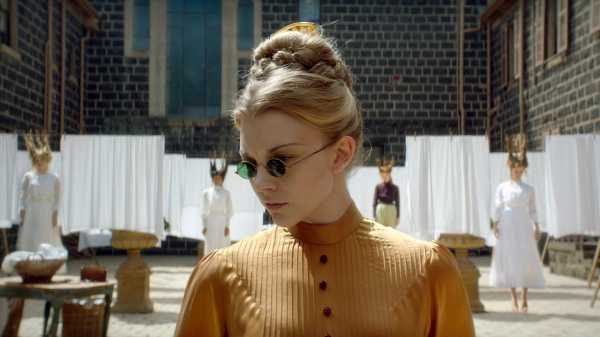
In the ghostly scheme of “Picnic at Hanging Rock,” students of Appleyard College for Young Ladies descend from their Australian boarding school, on Valentine’s Day, 1900, embarking on a day trip for a luncheon on the grass. Three high-spirited students and one teacher stray from the group and vanish. One survivor turns up, many days later, with a hole in her memory and a scar on her soul. The others seem to have slipped through a crevice in space-time.
The brilliance of the story—in Joan Lindsay’s 1967 novel, in Peter Weir’s 1975 film version, and in the six-episode adaptation now arriving on Amazon Prime—is its reticence in keeping the nature of the mystery as enigmatic as its meaning. Maybe the girls were raptured from the very-late-Victorian era into a dimension free of its strictures, and maybe their erasure was the paranormal signal of their oppression. Either way, they are figures in a genteel gothic fiction, spectral under shimmering sunlight.
The series fleshes out the story by burrowing into the scenario, digging tunnels to build new narrative pathways. Here, headmistress Hester Appleyard (Natalie Dormer) is not simply a rigid disciplinarian but a talented imposter—a scoundrel passing as a bluestocking. Posing as a widow with a background in respectable London, she has gone to the bottom of the world to keep a criminal past at a distance. In the opening scene, set years before the main action, Appleyard follows an estate agent on a tour of the mansion that will become her campus. Dressed in mourning clothes, she speaks sparingly. When the agent asks whether a smaller house closer to town “might be more suitable,” her black veil gives an sharp rustle—a noise as crisp as the crushing of a hatchling—as she swivels her head to glare in reproach. Her gestures tend to inspire dread, and the narrative design of a murderous crook adopting the guise of a strict schoolmarm gives both pulpy vigor and sensitive shading to the series’s themes of control and repression.
Beaming and brooding at the center of the action are the school’s most glamorous pupils. Irma Leopold (Samara Weaving) is here a Rothschild heiress; when passing through a crowd, she leaves in her wake gasps at her wealth and anti-Semitic murmurs about her ancestry. Marion Quade (Madeleine Madden) is the illegitimate daughter of a judge and his Aboriginal mistress; her bookishness is the basis for an improper romance with Miss McCraw, the teacher sucked into the unknown. Miranda Reid (Lily Sullivan) has hair like “a Botticelli angel,” as another teacher says, and lost eyes, and often bare feet, on which she truantly pads through the dewy grass in the dawn light.
In flashbacks that knit a portrait of agitated pubescence, they chat and lounge and sift through their sexualities and luxuriate in their problems, as teen-agers do. At the picnic, the three of them—adhered to a fussbudget fellow-student, joined by Miss McCraw, and shadowed by a marriageable young man who happens to be picnicking with his high-class relations—venture away from the group at an inauspicious moment. The hands of all the pocket watches on the scene go haywire, trembling at twelve o’clock, as if the site were dominated by occult energies.
The buildup to the disappearance—with spectral horsemen on the road and a gauzy texture to the air—has a memorably dreamy haze to it, sharply melancholy. This mood, and much else in the first episode, borrows from Sofia Coppola’s studies of young women lunging toward adulthood. The painterly compositions, the anachronistic soundtrack, and the delicious vividness of the teacher’s gowns all point toward this debt. Not to mention that Dormer, playing the perennially peeved Mrs. Appleyard, bears a strong resemblance to Kirsten Dunst on the brink of a snit.
There is a provocative symmetry in this. Admiring critics of Coppola’s first film, “The Virgin Suicides,” have long observed the resonance of Weir’s “Hanging Rock” on its vision; the production designer of her most recent film, “The Beguiled,” has credited Weir’s film as an influence on its look. In re-borrowing moves from Coppola’s stylebook, this “Picnic at Hanging Rock” rediscovers the tale as an evocation of late adolescence and all its unsolvable puzzles.
Sourse: newyorker.com






